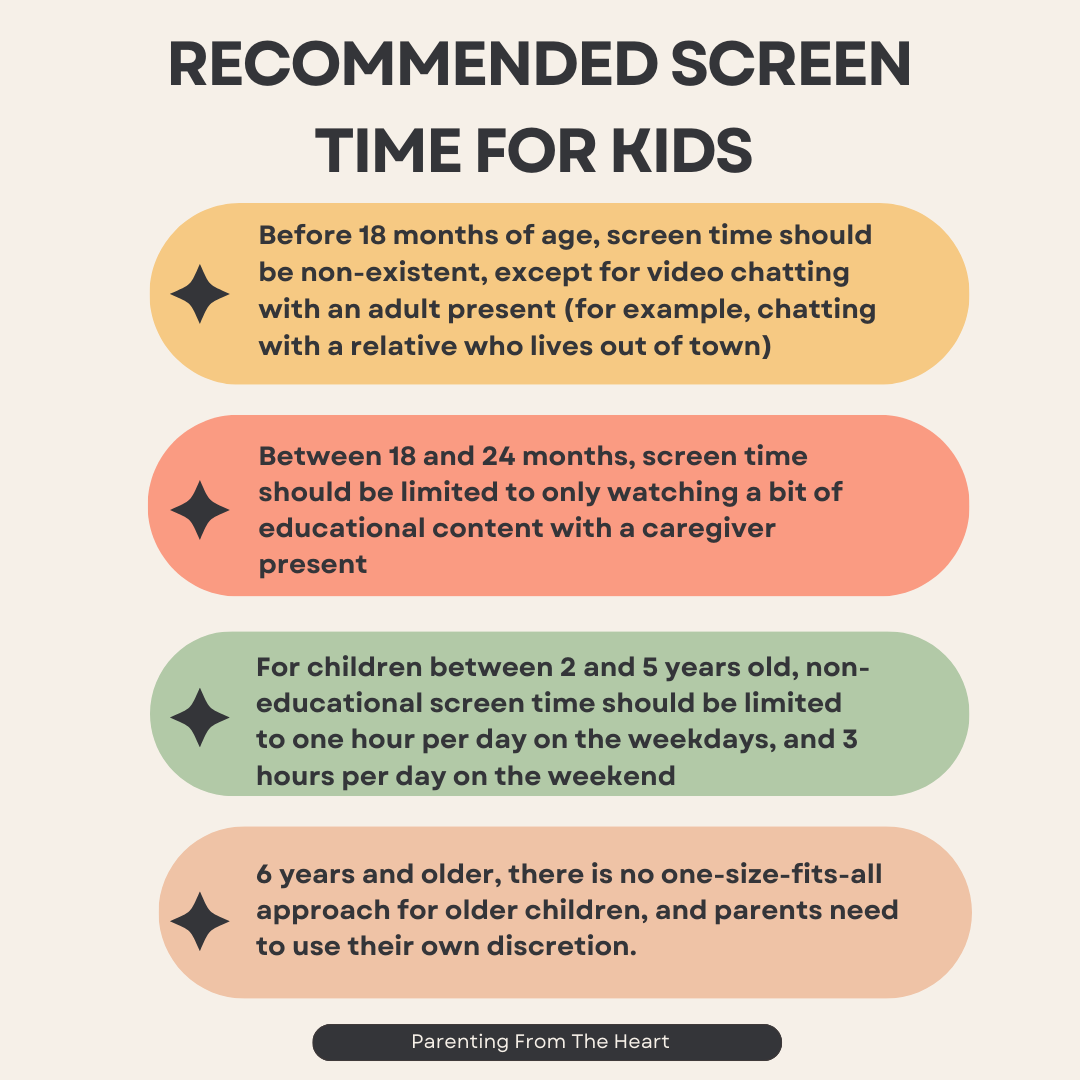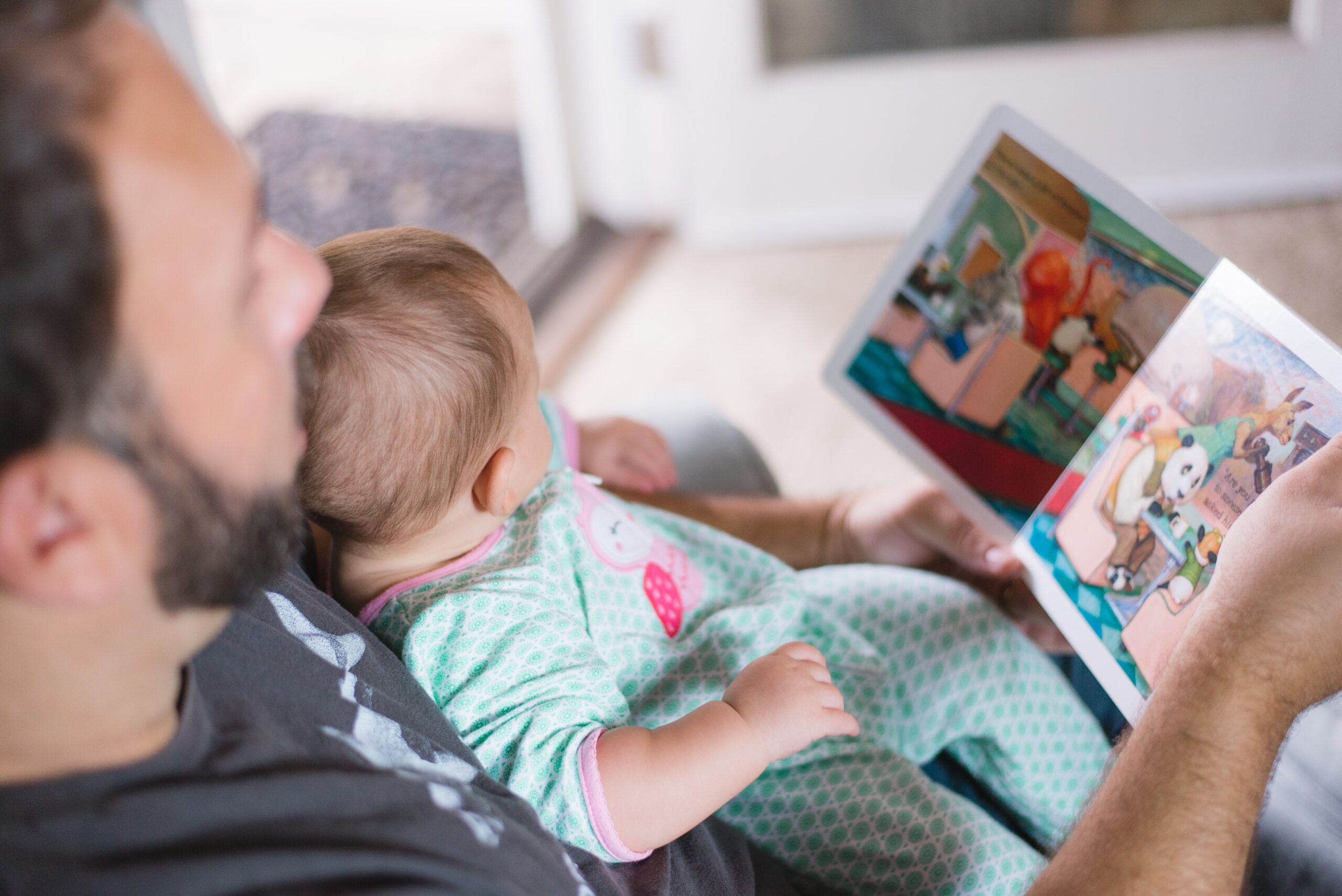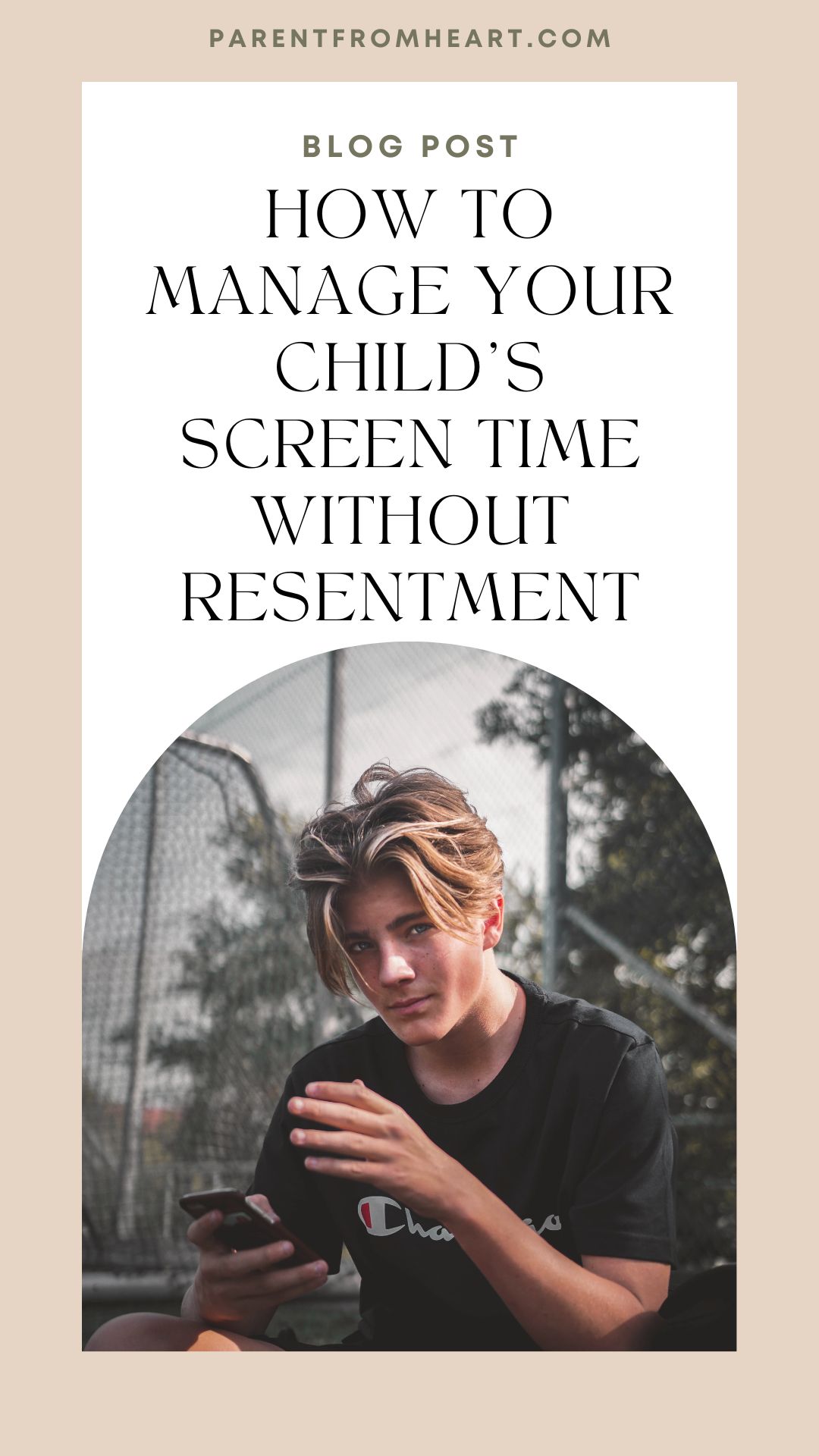Table of Contents
I still remember the day my husband and I got our first Smartphone. It was the winter of 2010, and we had finally decided to jump on the Smartphone bandwagon. Sitting on the couch, I recall being blown away by the technology and all the amazing apps and games I could install and play. We spent the entire day sitting on the couch exploring our new phones, I kid you not. And, while not every day was spent staring at our phones, it was a turning point in our lives where technology and too much screen time suddenly became the norm.
Fast forward 13 years and screens continue to be constant in our lives, whether it be for work or for play. Now that we are parents though, we seek to find a balance for our screen time usage and we monitor our children’s usage as well. That’s not always easy to do though, and there have been many disagreements in our household over how much screen time is too much, often resulting in my son being very disappointed with having to turn his off and take a break.

So, how do we find that balance? How do we navigate this world of technology and create limits and boundaries to protect our children’s health and well-being? And, how do we do all this without our kids completely resenting us and arguing with us every day?
Luckily, some answers can help us to figure all of this out. Read on to learn about what the recommended screen time limits are from medical professionals and what the side effects are from too much screen time. We will also share the top 10 tips and strategies for managing your child’s screen time without creating an ongoing battle with them.
How Much Time Are Kids On Screens?

While the numbers tend to differ somewhat, the consensus is clear: children are on screens a lot these days. In fact, according to the Centers for Disease Control and Prevention, children between the ages of 8 and 18 are spending a staggering 7.5 hours in front of a screen every day for entertainment. This does not even include the amount of time spent on a screen for educational purposes, which could potentially add an additional 3 to 4 hours.
Broken down even further, children between 8-10 years old spend approximately 6 hours a day on a screen, while 11-14-year-old kids spend a shocking 9 hours a day on their screens. Teenagers between 15-18 years of age are still quite high at 7.5 hours a day on screens. Again, this does not even include educational time spent on a device or screen. This amount of time is very concerning when children require fresh air and physical activity to be healthy and developing as they should be.
Recommended Daily Screen Time Limits

With such a vast increase in screen time over the past several years, various organizations have voiced concern. Many have made recommendations about how much time children should spend in front of a screen each day. The numbers are much lower than the average time that children are currently spending. We as parents must make some changes in our approach to screen usage in the home.
According to the American Psychological Association, organizations like the World Health Organization (WHO) and the American Academy of Child & Adolescent Psychiatry (AACAP) have both voiced recommendations for less screen time. Their recommendations are broken down as follows:
• before 18 months of age, screen time should be non-existent, except for video chatting with an adult present (for example, chatting with a relative who lives out of town)
• between 18 and 24 months, screen time should be limited to only watching a bit of educational content with a caregiver present
• for children between 2 and 5 years old, non-educational screen time should be limited to one hour per day on the weekdays, and 3 hours per day on the weekend
• for children ages 6 years and older, the AACAP recommends instilling healthy habits and screen time limits within the home but does not offer specific recommendations for daily screen time limits, because there is no one-size-fits-all approach for older children, and parents need to use their own discretion.
As the American Psychological Association explains, “[m]any studies lump all screen time together into one category, though it seems unlikely that video chatting with Grandma, for example, would have much in common with playing Grand Theft Auto V.”
The Effects of Too Much Screen Time
Parenting is not an easy journey at the best of times, but the rise of technology in recent years, it has added an extra element of worry for parents. Research indicates that 71% of parents are concerned about how much time their child spends in front of a screen, with 31% expressing that they feel very concerned about it and with good reason. There are several negative side effects from too much screen time, including the following.
1. Obesity
When children are sitting in front of a screen, they are not being active. It is recommended that children are physically active for a minimum of an hour a day, but if they are spending all that time on a device, then they are not getting that recommended amount of activity. A lack of physical activity can lead to childhood obesity, which in turn can lead to numerous health difficulties down the road, including diabetes and high blood pressure.
2. Irregular Sleep
Video games and television shows are incredibly stimulating for young brains, and it can make it hard for them to shut off and prepare for sleep. If children are on their screens right up until bedtime, then falling asleep can be quite a challenge. This in turn can lead to chronic tiredness, mood swings, lack of emotional regulation, and difficulty paying attention. Sleep is critical for children, and if they are not getting enough, it can drastically hinder their emotional and physical development.

3. Behavioral Difficulties
Too much screen time can result in behavioral difficulties such as a lack of patience and tolerance. Dr. Samina Yousuf of OSF Healthcare explains that when it comes to video games or television programs, it is instant gratification, there is no waiting required. So, children get used to having their needs met instantly, without having to develop patience. If they tend to be on their screens too much, this can prove to be very difficult for them and can result in behavioral challenges.
4. Poor Academic Results
It is not surprising that given a lack of sleep and a decrease in patience, children would also have trouble in school. If they are spending too much time on their devices and not getting enough sleep or physical activity, then they will certainly have trouble following along in class and completing the required class work.
As a classroom teacher, I unfortunately see first-hand the result of too much screen time; children who have been up all night gaming and then having a hard time doing their class work. This can have long-term ramifications that impact a student’s academic success throughout their educational career.
5. Desensitization to Violence
Many of the video games that are popular these days have a lot of violence in them. Despite the age recommendations on the games, children as young as 5 years old are accessing them. This is very concerning, as children are becoming desensitized to violence and thinking that this is a normal way to behave and solve problems.
10 Ways to Limit Screen Time Without Resentment
With all this information, it is clear that parents need to step in and set some clear limits on screen time, to avoid some of the negative side effects listed above. While it can be challenging trying to establish these limits, it is crucial that we do. So, how can we set those limits without fostering resentment? Read on to find out!
1. Set Clear and Realistic Limits
If you are wishy-washy with your screen limits, then your children will always be questioning them. Set clear and realistic limits, so your children know exactly where you stand. Be realistic with your screen time limits, and take into account what your child is using their screen time for. If your older child is using their phone to Facetime friends, for example, that should be taken into account. Socializing with friends is better than sitting and staring passively at a television show.

2. Lead by Example
Is your phone always glued to your hand? Try to get a handle on that too then (no pun intended!). If you are always on your screen, then your child won’t see anything wrong with it either. Make an effort to limit the amount of time you’re spending on a screen. Set a time limit to finish your work, and find ways to relax that don’t involve scrolling on social media.
3. Create Screen-Free Zones and/or Days
This is one of the best ways to limit screen time in your home. Create screen-free zones in the house, such as at the supper table or in the bedrooms. Remove televisions from your children’s bedroom, and have them charge their phones in the kitchen at bedtime.
You could also implement screen-free days, where everyone in the home goes without their screens. It is a great opportunity for family bonding and it will help to limit your children’s screen time.
4. Offer Attractive Alternatives

Start at an early age to introduce your children to activities such as reading and playing outside. Reading to your child from an early age fosters a love of reading that will carry into their adolescence. Showing them the wonders of being outdoors helps them to develop a love of nature and playing outside. Developing these habits early in life will help your child to find other avenues for entertainment.
5. Encourage Social Interactions
Get your children interacting with others as much as you can. This helps them to develop their social skills and get off screens. Set up playdates or family outings that get them out of the house and doing something fun. Plan a family game night with relatives, and let your child pick the game. Encouraging these social interactions will help to limit screen time and develop your child’s interpersonal skills.
6. Implement a Screen Time Schedule
All children could benefit from a screen time schedule, but this can be especially helpful for little ones. Set up an age-appropriate schedule for screens, depending on how old your children are. Post a visual schedule in the house, so that you can refer to it regularly. This way, it does not become an endless battle. You simply remind your toddler or young child that it is not time for screens yet.
7. Use Educational Screen Time Wisely
If your child is using their device for educational reasons, take that into consideration. Your child will sometimes have homework that requires the use of a screen. This shouldn’t mean that they can’t have any relaxing time afterward on their screen, but it should be limited. Encourage outdoor play when they’re done, instead of choosing to watch a show.
8. Incorporate Positive Reinforcement
It can help to implement a reward system for adherence to screen time limits. This can be very effective for little ones who want to play on a screen. Offer a reward for sticking to the screen time schedule. Consider giving a special little treat or privilege if your child adheres to it without argument. Verbal praise works well too, letting your child know that you see how they are making healthy choices when it comes to their screen time usage.

9. Encourage Open Communication
Open communication is so important for positive relationships. Allow your child to speak freely and voice their concerns without fear of reprimand. Be willing to listen to your child about their concerns around screen time. Try to avoid judgment and listen to their feelings without arguing. Consider making adjustments to your screen time limits if necessary.
10. Be Consistent But Flexible
It is important to be consistent when implementing any kind of rule or limit in your home. Children rely on consistency and boundaries to feel safe and secure and to know where they stand. That being said, it’s important to be flexible and willing to make changes if necessary. As your child gets older, their interests will evolve and may require additional considerations for screen time.
Need a Screen Time Detox?
Have things gotten to a point where everyone in the home would benefit from a screen detox? Sometimes, life gets so busy that we get wrapped up in the day-to-day chaos and lose sight of what is important. If you are finding that your home could benefit from a digital detox, try these simple strategies.
1. Screen-free meal times
Don’t allow any screens when your children are eating, and foster family meals where everyone participates in the conversation.
2. Turn screens off one hour before bedtime
Give your child time to relax and calm their mind before hitting the hay. Set up a new bedtime routine that involves reading them a story or chatting about their day, instead of staring at a screen.
3. Determine screen-free days
Set at least one day per week as a screen-free day, where everyone in the family (including you!) does not use their screens that day. Increase the number of screen-free days depending on how badly your family needs a digital detox.
4. Replace screen time with active time
Choose a family activity that you can all do that will get your kids up and moving. Go for a walk or a bike ride, visit a local park, start playing a new sport, have a dance party, or take the dog for a walk.

5. Offer new and exciting activities
It can be hard to break away from screens, especially when they are so engaging and interactive. However, it is possible. Introduce new activities that your child would enjoy, such as arts and crafts, a new board game, or an adventure outside. Making being off their screen more appealing than being on it.
Conclusion
When I think back to how life has changed since the invention of the Smartphone, I am shocked by how quickly and drastically screens have taken over our lives. I find myself reaching for my phone when I have half a second to myself, as it is my way to relax and unwind. This isn’t healthy for me, and it especially isn’t healthy for our children.
We as parents must be aware of how much time our children are spending in front of a screen. If we determine that it is too much time, then we must take steps to remedy that. If you too are noticing that your child is spending too much time on their devices, then try implementing some of these simple strategies.
While the strategies themselves are relatively simple, putting them into action isn’t always easy. Give yourself grace when starting out, and recognize that it will take time for everyone to get used to the new limits. Teach healthy habits from an early age, like fostering a love of reading and being outdoors. This will help you to manage your child’s screen time without causing resentment or arguments in the household. Take it a step at a time, and start this digital detox today!
Like this post? Click on the image below to share this on Pinterest – Thank you!












